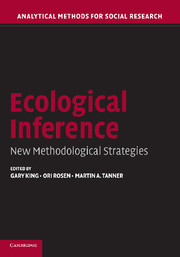Book contents
- Frontmatter
- Contents
- Contributors
- Preface
- INTRODUCTION
- PART ONE
- PART TWO
- PART THREE
- 9 Ecological Inference in the Presence of Temporal Dependence
- 10 A Spatial View of the Ecological Inference Problem
- 11 Places and Relationships in Ecological Inference
- 12 Ecological Inference Incorporating Spatial Dependence
- PART FOUR
- Index
9 - Ecological Inference in the Presence of Temporal Dependence
Published online by Cambridge University Press: 18 May 2010
- Frontmatter
- Contents
- Contributors
- Preface
- INTRODUCTION
- PART ONE
- PART TWO
- PART THREE
- 9 Ecological Inference in the Presence of Temporal Dependence
- 10 A Spatial View of the Ecological Inference Problem
- 11 Places and Relationships in Ecological Inference
- 12 Ecological Inference Incorporating Spatial Dependence
- PART FOUR
- Index
Summary
ABSTRACT
Researchers have realized for some time that the quality of ecological inferences depends critically on the quality of the prior assumptions one makes. In many applications, the most uncontroversial piece of background knowledge is that the interior cell probabilities of interest exhibit substantial stability over time. Seen this way, temporal dependence is not a nuisance to be statistically accounted for, but rather an important piece of background knowledge that can be used by researchers to form more accurate prior distributions for the interior cell probabilities of interest. In this manuscript we develop a class of Bayesian hierarchical models that can be used for ecological inference where there is a priori reason to believe temporal dependence is present. A version of the model is applied to simulated data as well as data on voting registration by race in Louisiana counties over a 14-year period. Within the context of these data, the proposed dynamic model performs reasonably well.
INTRODUCTION
Researchers have realized for some time that the quality of ecological inferences depends critically on the quality of the prior assumptions one makes. This is true regardless of whether the prior assumptions are explicitly stated, as in a Bayesian analysis, or are left implicit. The key to making reasonable ecological inferences then is seen to be, to a large extent, dependent upon one's ability to formulate reasonable prior beliefs about the process under study.
- Type
- Chapter
- Information
- Ecological InferenceNew Methodological Strategies, pp. 207 - 232Publisher: Cambridge University PressPrint publication year: 2004
- 4
- Cited by

